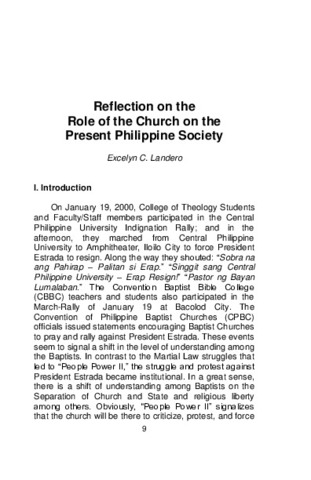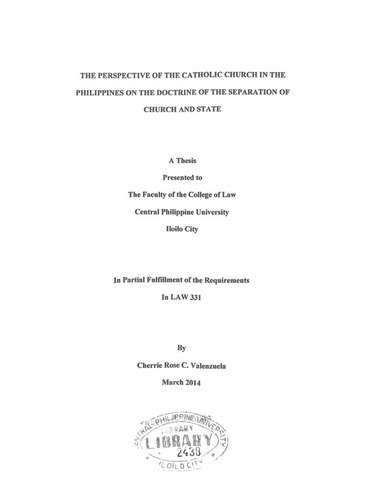Ipakita ang simpleng tala ng item
The role of the Church on the present Philippine society
| dc.contributor.author | Landero, Excelyn C. | |
| dc.date.accessioned | 2022-01-17T00:29:26Z | |
| dc.date.available | 2022-01-17T00:29:26Z | |
| dc.date.issued | 2005 | |
| dc.identifier.citation | Landero, E. C. (2005). The role of the Church on the present Philippine society. Journal of Theology, 1, 9-28. | en_US |
| dc.identifier.uri | https://hdl.handle.net/20.500.12852/1867 | |
| dc.description | Journal article | en_US |
| dc.description.abstract | On January 19, 2000, College of Theology Students and Faculty/Staff members participated in the Central Philippine University Indignation Rally; and in the afternoon, they marched from Central Philippine University to Amphitheater, Iloilo City to force President Estrada to resign. Along the way they shouted: “Sobra na ang Pahirap – Palitan si Erap.” “Singgit sang Central Philippine University – Erap Resign!” “Pastor ng Bayan Lumalaban.” The Convention Baptist Bible College (CBBC) teachers and students also participated in the March-Rally of January 19 at Bacolod City. The Convention of Philippine Baptist Churches (CPBC) officials issued statements encouraging Baptist Churches to pray and rally against President Estrada. These events seem to signal a shift in the level of understanding among the Baptists. In contrast to the Martial Law struggles that led to “People Power II,” the struggle and protest against President Estrada became institutional. In a great sense, there is a shift of understanding among Baptists on the Separation of Church and State and religious liberty among others. Obviously, "People Power II” signalizes that the church will be there to criticize, protest, and force corrupt government officials to perform well otherwise they will be forced to resign or to be ousted by the people including the church. This paper will attempt to find out the Role of the Church in the present Philippine Society specifically on the concept of the church, on the principles relating to the separation of the Church and society on the response of church’s own understanding of its existence, and the writer’s Theological Reflection. | en_US |
| dc.language.iso | en | en_US |
| dc.publisher | Institute of Advanced Theological Studies (IATS) and College of Theology | en_US |
| dc.subject.lcsh | Church and state | en_US |
| dc.subject.lcsh | Freedom of religion | en_US |
| dc.subject.lcsh | Church and the world | en_US |
| dc.subject.lcsh | Church and social problems | en_US |
| dc.subject.lcsh | Social justice--Religious aspects | en_US |
| dc.subject.lcsh | Social justice--Religious aspects--Catholic Church | en_US |
| dc.subject.lcsh | Social justice--Religious aspects--Christianity | en_US |
| dc.subject.lcsh | Church history | en_US |
| dc.subject.lcsh | Philippines | en_US |
| dc.title | The role of the Church on the present Philippine society | en_US |
| dc.type | Article | en_US |
| dc.citation.firstpage | 9 | en_US |
| dc.citation.lastpage | 28 | en_US |
| dc.citation.journaltitle | Journal of Theology | en_US |
| dc.citation.volume | 1 | en_US |
| dc.citation.issue | 1 | en_US |
| local.subject | People Power II | en_US |
Mga file sa item na ito
Lumilitaw ang item na ito sa mga sumusunod na (mga) Koleksyon
-
Journal articles [28]
-
Journal of Theology [24]
A joint publication of the Institute for Advanced Theological Studies (IATS) and College of Theology, Central Philippine University





